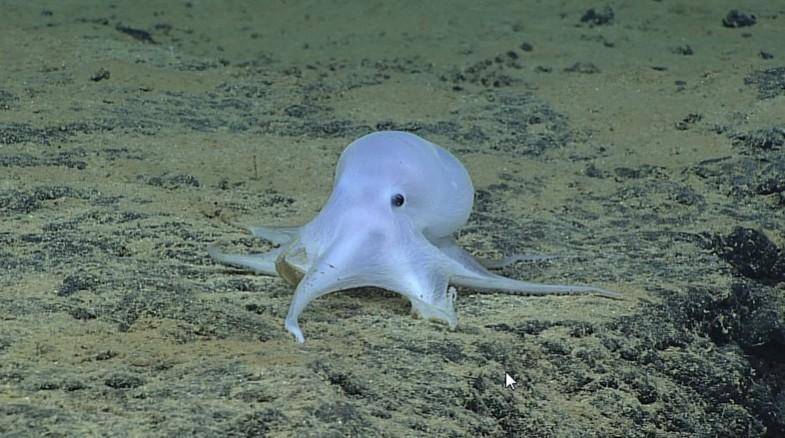
Ocean explorers and researchers scanning the seabed were stunned to find 'Ghost Octopod' 13,000 feet below, nestled among metal balls, near the northeast side of Necker or Mokumanamana Island in the Hawaiian Archipelago.
The Pacific Ocean floor has metal manganese that eventually coalescence to form metal lumps or balls also called nodules. Similar nodules were also found in Atlantic and the UN permitted harvesting of these nodules (deep sea mining) that also contained cobalt and zinc, the Washington Post reported.
Since there were no sea creatures at that depth, removing these balls did not disturb the environment.
"It is quite possible that living creatures find the immediate vicinity of the nodules quite inhospitable," said Angelika Brandt, part of the University of Hamburg's team that discovered the large Atlantic manganese nodule field.
However, new research, backed by video evidence on these metal fields has thrown light on the existence of under sea creatures. One such find is the glowing and ghostly octopod, dubbed 'Casper' after the popular movie. The octopods are also called deep-sea incirrate octopods, according to journal Current Biology.
The discovery of the Casper Octopod by National Oceanic and Atmospheric Administration's (NOAA) Okeanos team in March 2016 was widely reported.
Happy #Halloween from “Casper,” the friendly ghostlike octopus! Seen on #Okeanos expedition off Hawaii, it is likely a new species! pic.twitter.com/JFnrr6GWsi
— NOAA Ocean Explorer (@oceanexplorer) October 31, 2016
Casper got his ghostly appearance due to the absence of pigment cells and was not muscular either. It was a new species that was not discovered before.
The new study by a team of German and American scientists led by the Helmholtz Center for Polar and Marine Research noted that the octopods like Casper lived near the manganese nodes.
Moreover, video footage gathered evidence that the creatures cleaned the seabed around nodules and are seen digging through the sediment, perhaps for food, evolutionary ecologist Henk-Jan Hoving said in a statement.
These scientists also observed egg-laying behaviour as they saw two octopods clinging to the stalks of the dead sponges that were anchored on the manganese nodes. The sponges require manganese to grow. The two were seen brooding clutches of eggs, and a good place to guard their eggs.
Deep sea mining causing habitat loss?
The scientists and biologists are worried that deep sea mining here would lead to habitat loss as the Caspers will not have any place to lay their eggs.
"The brooding observation is important as these sponges only grow in some areas on small, hard nodules or rocky crusts of interest to mining companies because of the metal they contain," said Autun Purser, of the Alfred Wegener Institute's Helmholtz Centre for Polar and Marine Research in Germany, BBC reported.
"The removal of these nodules may therefore put the lifecycle of these octopods at risk," Purser added.
The scientists concluded their research by saying, "The brooding behaviour of the octopods we observed suggests that, like the sponges, they may also be susceptible to habitat loss following the removal of nodule fields and crusts by commercial exploitation."














